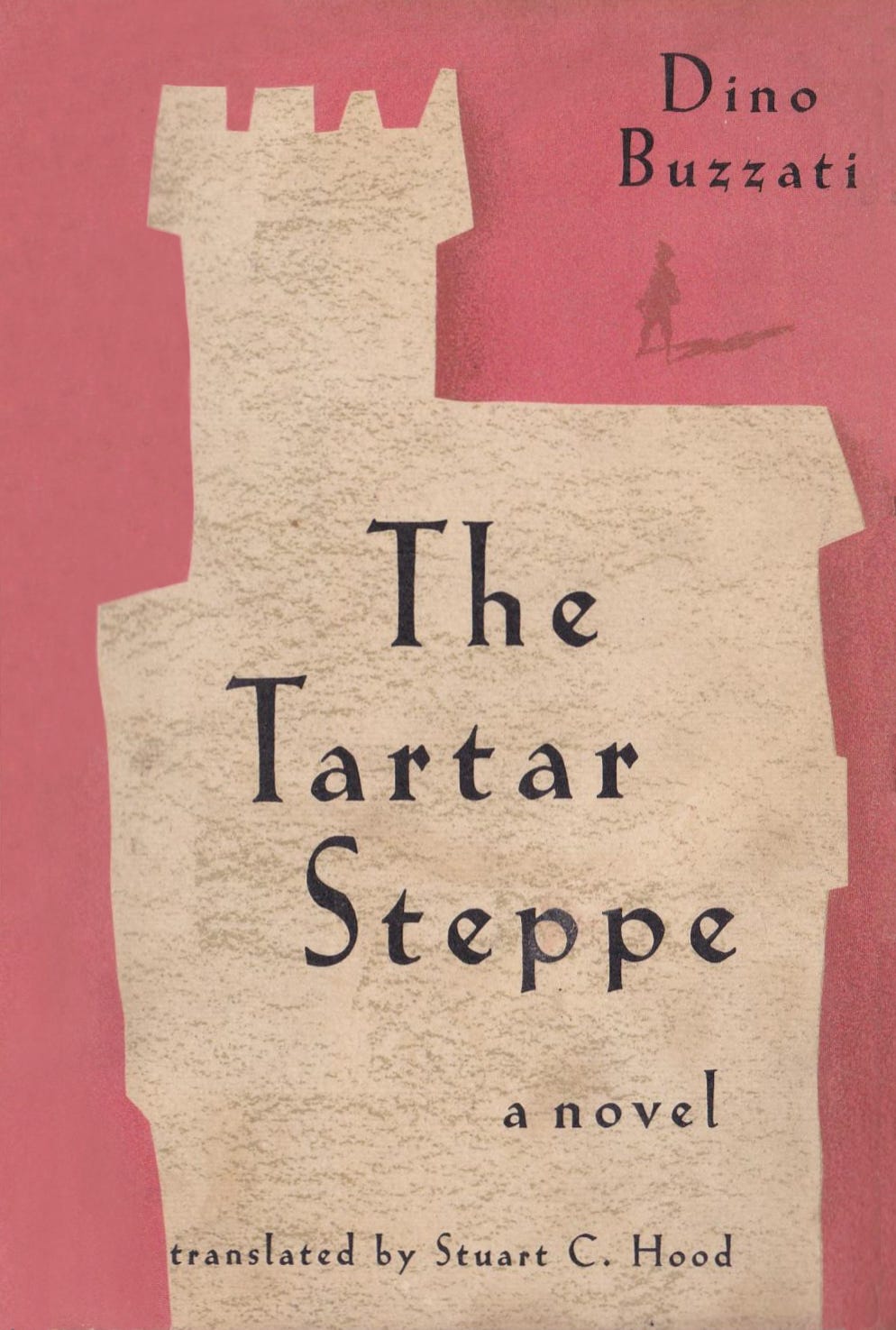There are masterpieces in literature that never make it to the Anglo-Saxon World. When you do stumble upon them, often by chance, you find yourself wishing you had discovered them sooner. These books can teach you one or two valuable lessons on life and existence.
One of these books is The Tartar Steppe, a complex and powerful story by the Italian novelist and journalist Dino Buzzati. It was written in 1938, amidst Mussolini’s dictatorship in Italy.
It follows Giovanni Drogo, a young officer who, fresh out of the military academy, is assigned to Fort Bastiani, a desolate outpost located on the highest and most inaccessible of mountain terrains, overlooking the vast, empty Tartar Steppe. Initially, Drogo plans to stay only for a short period before moving on to a more vibrant life in the city. But he cannot tear himself away. The beauty of the place—the cold mountains and the desert—cast a life-sapping spell on him, and he remains there for thirty years. As time goes by, Drogo lingers in a state of perpetual readiness, waiting for an enemy that never arrives, until eventually, he realises the futility of his hopes and dreams.
It was from the northern steppe that their fortune would come, their adventure, the miraculous hour which once at least fall’s to each man’s lot. Because of this remote possibility which seemed to become more and more uncertain as time went on, grown men lived out their lives pointlessly here in the Fort.
Tartar Steppe is an exploration of existential themes, the nature of human existence, the passage of time, and the futility of a purposeless existence. The fort, with its decaying walls and rigid hierarchy, represents the social norms and the beliefs that we build around ourselves to stave off the fear of insignificance or uncertainties, yet these very structures often imprison us.
Buzzati’s portrayal of time is central to the narrative. Drogo's initial eagerness gives way to a monotonous routine as years slip by unnoticed. The fort becomes a timeless place, a physical and psychological prison where the days blend into each other, mirroring the way people often lose track of time in their own lives, waiting for a significant event or change, only to find – usually very late - that it never materializes.
But Drogo did not know, he did not suspect, that his departure would have been an effort nor that life in the Fort would shallow up the days one after another, one exactly like the other, at giddy speed. Yesterday and the day before it were the same; he could no longer have distinguished one from the other. Something which happened three days before or three weeks before seemed equally distant.
The steppe becomes the focal point in Drogo’s life; it represents the illusion of a better, more heroic future. He waits for the enemy to come as a form of validation and salvation, just as the two tramps in Beckett's play wait for Godot. In this story, the enemy does eventually emerge, but for Giovanni Drogo, it is too late. At the climax of his 30 years there, he will be ejected from the fort by those with whom he spent every day of all these years together.
Then he saw how unimportant it had been to wear himself out on the ramparts of the Fort, to scan the desolate northern steppe, to strive after a career, to wait such long years.
At the same time, the steppe also symbolises freedom and the untamed wildness of nature. As Tim Parks writes in his wonderful introduction, ‘while the initial inspiration for the Tartar Steppe may indeed have come out of the fear that a mindless office routine was wasting up his life, Buzzati nevertheless chose to set that routine in a landscape that was his chief recreation, and also something he was clearly in thrall to, a limit-experience for him, a drug almost, an endless source of exhilaration. … The mountains, we discover, offer a marvellous view of the world.”
The boundless horizons offer a sense of escape from the constraints of society. This dual symbolism—of indifference and freedom—captures the complexity of the human relationship with nature. Nature’s beauty can be both a source of existential anxiety and unbounded potential.
Buzzati’s simple and detached narrative reflects Drogo’s disconnection from his own life. This hauntingly beautiful book challenges us to reflect on our own lives and the way we allow time to slip away, waiting for something that was never meant to arrive.
Buzzati submitted his manuscript to the publishers in January 1939, on the eve of World War II. It was the era that resonated with existentialist ideas, questioning the meaning of life and the choices we make. Buzzati echoes Sartre’s notion of nothingness and Albert Camus’s belief that life is inherently meaningless and irrational. As Europe awaited the impended invasion of the barbarians, Buzzati reminds us that responding to the fear of nothingness by clinging to conformity, tradition and predefined meanings of existence can ironically become a source of nothingness itself.





